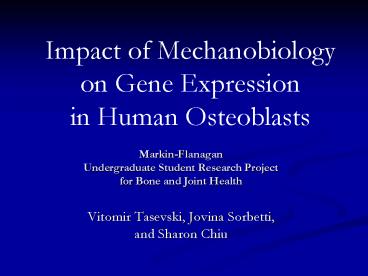Impact of Mechanobiology on Gene Expression in Human Osteoblasts - PowerPoint PPT Presentation
1 / 18
Title:
Impact of Mechanobiology on Gene Expression in Human Osteoblasts
Description:
Cell culture plates were overlaid with sterile canola oil at 37oC. ... Canola Oil Overlay. Cell Growth Media and. Cell Monolayer ... – PowerPoint PPT presentation
Number of Views:253
Avg rating:3.0/5.0
Title: Impact of Mechanobiology on Gene Expression in Human Osteoblasts
1
Impact of Mechanobiology on Gene Expression in
Human Osteoblasts
Markin-Flanagan Undergraduate Student Research
Project for Bone and Joint Health
- Vitomir Tasevski, Jovina Sorbetti,
- and Sharon Chiu
2
Introduction
- Bone cells in vivo are constantly exposed to
physiological forces. - The majority of cell studies are conducted in
vitro without biomechanical stimuli. - Cell cultures were exposed to hydrostatic
pressure (HP) using a specially designed pressure
chamber. - MG-63 human osteosarcoma cell line was tested.
3
Aims
- The specific aims of this study were to
- validate the pressure apparatus.
- characterise the MG-63 cell line.
- examine the effect of the hormone 1,25 dihydroxy
vitamin D3 (1,25(OH)2D3). - determine the effects of HP on the cells.
- compare the effects of static and cyclic HP.
4
Methods Cells
- Cells were routinely cultured with DMEM-F12
medium containing 10 fetal calf serum. - Cells were seeded into 6 well plates at 2 x 105
cells/well and grown for 48 hours. - The medium was changed to serum free or serum
free with 1,25(OH)2D3 and incubated for 20 hours.
5
Methods Apparatus
- Cell culture plates were overlaid with sterile
canola oil at 37oC. - The chamber was filled with oil and immersed in a
37oC water bath. - 1 MPa of pressure was applied in either a static
or a cyclic fashion. - All tests were run for a total time of 4 hours.
6
Canola Oil Overlay
Cell Growth Media and Cell Monolayer
Figure 1 Cross Section of 6-well Culture Plate
7
Piston of MTS Steel Chamber Rack for Cell Culture
Plates Canola Oil Water Bath at 37oC
Figure 2 Cross Section of the Pressure Apparatus
8
Methods Analysis
- Cells were washed with PBS and lysed with Trizol.
- RNA was successfully extracted and PCR was
carried out with the cDNA. - Validated primers for a series of genes were
used - GAPDH, Cbfa1, and osteocalcin.
- MMP-1, -2, -3 and 13.
- Collagen-I, biglycan, lumican, Timp-1, cfos, and
cjun.
9
Results
- Cells subjected to static or cyclic HP showed an
increase in mRNA levels of MMP-1 and -3. - Cells treated with 1,25(OH)2D3 showed
- an increase in osteocalcin expression.
- a decrease in expression of MMP-1 and -3.
- Cells exposed to 1,25(OH)2D3 and HP showed an
increase in expression of MMP-1 and -3. - No change in mRNA levels of any of the other
genes was measured.
10
- Figure 3 Effect of static HP (1.0MPa) on mRNA
- levels for GAPDH, MMP-1 and 3
- p lt 0.001 compared to controls
11
Figure 4 Effect of cyclic HP (0-1.0MPa) on
mRNA levels for GAPDH, MMP-1 and -3 p lt 0.001
compared to controls
12
Figure 5 Effect of cyclic HP (0-1.0MPa) on
Osteocalcin mRNA levels p lt 0.001 compared to
controls
13
Figure 6 Effect of cyclic HP (0-1.0MPa) on MMP-1
and -3 mRNA levels p lt
0.001 compared to control p lt 0.01
compared to 1,25(OH)2D3 or to Pressure
14
Discussion MMP-1 and -3
- Changes in MMP-1 and -3 suggests that
biomechanical loading affects bone remodelling - MMP-1 breaks down collagens I, II, III and X.
- MMP-3 breaks down collagen III and IV,
- laminin, fibronectin, and proteoglycan.
- The lack of change in the other genes indicates a
specific cell response to HP.
15
Discussion Osteoclacin
- Cbfa1 and Osteocalcin are markers of early and
late osteoblast differentiation, respectively. - They did not change with exposure to HP.
- Implies that neither static nor cyclic HP led to
changes in differentiation of osteoblastic cells.
16
Discussion Vitamin D3
- Increase in the mRNA levels of osteocalcin in
cultures exposed to 1,25(OH)2D3 was associated
with differentiation in cells. - Cells were of a pre-osteoblastic phenotype.
- Cyclic HP had an effect on both pre- and
differentiated osteoblasts.
17
Conclusions
- Cells respond to their environment in a specific
manner. - Neither static nor cyclic HP led to changes in
differentiation in cells. - Cyclic HP affected pre- and differentiated
osteoblasts. - Biomechanical loading may play a significant role
in bone remodelling.
18
Future Directions
- A biomechanically active environment should be
considered when studying normal or diseased bone
homeostasis. - This system can be used to examine the effects of
HP on clonal or primary cells. - The effects of hormones and drugs could be
measured within a biomechanically active
environment.































